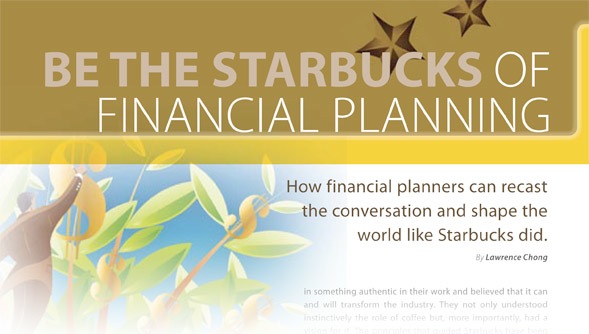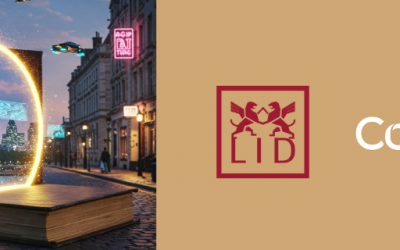Years ago at a book sale, I came across the title “Pour Your Heart Into It”. It cost me only 10 bucks and was probably the best book investment I have ever made. It was a heart-warming account of how, against all odds and with lots of passion, Howard Schultz went on to make the biggest brew of his life – Starbucks.
What really moved me was how he let his purpose guide his business. That made a huge difference for his growth story. The Starbucks people believed in something authentic in their work and believed that it can and will transform the industry. They not only instinctively understood the role of coffee but more importantly, had a vision for it. The principles that guided Starbucks have been inspirational to our firm and a reason for our accelerated growth in the region. We share these three insights, which we hope will help you build a financial-planning brand that can shape our world.
Don’t seek means. Seek purpose.
The recent massive shock to the financial system in 2009 is proof that to continuously seek means without purpose is not sustainable. The problem is that most people will just go along with their work without asking the deeper questions. Before Starbucks, it was accepted that coffee in America was supposed to be bad. Howard decided that it wasn’t true. His belief that it could be better became his guiding mantra. But this trend that I like to call “cruising along” happens in every industry.
Who said that bread must always be sold under dim lights and be stacked on dull shelves? Now we have BreadTalk. Anybody can start a business and own a trademark, but few will become brands. If you don’t have the fire of a rebel and a worthy cause to rally behind, the sole pursuit of means may be your downfall. One of the reasons heavyweights like Merrill Lynch and Lehman Brothers fell was that they lost sight of their purpose, blinded by the pursuit of more profits. To transit from trademark to brand, you must determine what the purpose of your work is. How will your work transform the lives of individuals and companies? How will it shape their destinies? The current crisis provides a perfect opportunity to do an examination of purpose. What does financial planning do for millions of people everyday? Don’t let fringe groups hijack the worthy cause of good financial planning by linking it to opportunistic practices. Carpe diem and recast the conversation on your terms before others do.
Don’t offer service. Offer a way of life.
Howard wanted to recapture his own experience of smelling freshly brewed coffee in an Italian bar. He understood that for his brand to succeed, he had to offer more than just good coffee. That is why the friendly barista, the environment and the music are important. If you believe your purpose can be enduring, people will automatically sense it in their encounters with you. As financial planning is purely a service industry, offering that unique encounter is important. After people have met with you, what do they tell you? Are they transformed by the encounter? These are telltale signs of whether you are merely offering service or creating a memorable experience.
Like the financial industry, brand consultancy is also service-based and driven by individuals. That is why we invest a lot of time and resources to ensure that our staff are aligned to our distinct code. Whenever individuals join us, they are asked to write a personal journey, stating what they would like to achieve when they leave our firm. When asked to do so, they are very surprised at how concerned we are about their personal branding and why we spend so much time in terms of mutual alignment. It is important because its shows, when you do not have passion for branding and it affects the service experience. As a litmus test, we frequently invite people to come for our weekly Consulus Circles so as to see if we are on the right track. Don’t think that your way is insignificant just because you may be alone because if you cannot believe in what you do, you cannot expect others to do the same. Start now and others will follow you.
Don’t try to be somebody else. Be yourself.
One of the limits that Howard learned is that however hard he tried, he cannot masquerade as an authentic Italian experience. Because of that realisation, the US now has a brand universally synonymous with good coffee. In all my travels, whenever I am tired and looking for a familiar place that sells good coffee, I always seek Starbucks. Starbucks’ signature ambience, with its Seattle-inspired wall-paper, warm colours and jazz music, is decidedly non-Italian.
Unfortunately, most companies and individuals do not dare to be themselves and forge a distinct identity. In the majority of industries, many companies and individuals appear predictably the same. Most IT companies seem to draw from the same palette of blue. Many financial-planning firms and individuals seem to speak from the same limited vocabulary. If the idea is to stand out, then I do not understand how using generic images of successful-looking models, money, compasses and maps in Powerpoint presentations will help.
In a campaign for a national bank in Southeast Asia, we persuaded them to avoid any use of prizes or generic images. We even removed many references to product information. Instead we started off with the question, “What is your wish?” We also asked participants to share their life goals with us. We believed that such a campaign was more in line with the bank’s vision. It was risky, but the enlightened management took it on. It got off to a flying start, with thousands of stories flooding in. Despite the initial worry that people would not share genuine concerns, many stories have been inspiring. It also brought the bank closer to its core customers. Build an identity that is yours alone. If you have an enduring and inclusive purpose, it will show. When you review all that represent you, such as logo, colours, name card and website, ask how they truly depict your purpose. Did your logo come from sheer necessity or was it borne from inspiration? How about the messages that you use? How would you have said it in your own distinct way?
This is the maxim we live by and it may be for you as well. We have but one life – we have to live it well. Aim for something higher. Perhaps when you realise that whatever you do now is an investment towards your legacy, you might wish to do it differently. Nowadays I tend to ask leaders, “When you leave this world, how would you like to be remembered?”
What will be your legacy? How will you shape our world?
Lawrence Chong is the CEO at Consulus. This article was originally published in ‘The Practice’ in July 2009 and was reproduced in The Daily Star in 2013.
This article is part of The Columnist, a newsletter by Consulus that offers ideas on business, design and world affairs. For past issues, browse the complete archive.





